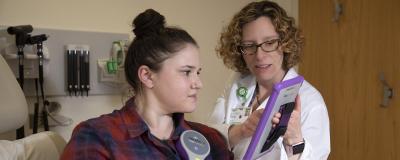The Rush Epilepsy Center is one of the largest, most comprehensive programs in the world specializing in the care of pediatric and adult patients with medically refractory epilepsy.
The Rush Epilepsy Center is accredited as a Level 4 epilepsy center by the National Association of Epilepsy Centers, the highest level possible. This designation is awarded to epilepsy centers offering the most advanced and comprehensive medical and psychosocial treatments, as well as innovative new treatment options.
Our interdisciplinary team treats patients with epilepsy-related disorders and co-occurring conditions. We innovate advanced therapies, offer specialized clinics, employ state-of-the-art clinical and surgical facilities, and actively pursue innovative technologies in the center’s applied research laboratories. We are committed to advancing the field through ongoing basic science as well as clinical research.
With significant comorbidities associated with epilepsy including mood disorders, cognitive and developmental disorders, as well as reproductive concerns, our team of epileptologists, neurosurgeons, neuropsychologists, clinical pharmacists, social workers and a dietician provides comprehensive treatment plans to improve not only seizure control, but patients’ quality of life as well.
Why refer your patients here?
The neurology and neurosurgery programs at Rush are ranked among the best in the nation by U.S. News & World Report.
Excellence in epilepsy clinical care. The Rush Epilepsy Center provides care for more than 5,000 patients every year, addressing the multidimensional needs of each patient, including medical, surgical, emotional, cognitive, and social. Every part of patients’ well-being is an integral part of the Rush mission.
EEG monitoring. Rush is the market leader in epilepsy treatment, specializing in remote electroencephalography (EEG) monitoring in the intensive care center with 15 portable units. Subspecialty clinics and services.
Subspecialty clinics and services. Rush offers several comprehensive subspecialty clinics including an epilepsy dietary clinic, neuromodulation clinic, and the only epilepsy-for-older-adults clinic in the state of Illinois. Rush provides personalized care for patients with fertility challenges and our specialty pharmacy dedicated to our epilepsy patients is an added vital resource. We also provide linguistically and culturally appropriate care to our Spanish speaking population.
Multimodal surgical planning. At Rush, we use high resolution three-dimensional MRI along with high-density electroencephalography (HDEEG) source modeling of ictal and interictal epileptiform activity to provide state-of-the-art localization of surgically amenable areas. Additionally, we improved upon these methods by combining quantitative MRI techniques, such as the measurement of cortical thickness and voxel-based morphometry with three-dimensional EEG source modeling, to provide supplementary three-dimensional multimodal visualization of brain abnormalities.
Neuromodulation. There are currently three FDA-approved neuromodulatory treatment options for patients with medically refractory epilepsy. These include responsive neurostimulation, vagus nerve stimulation, and deep brain stimulation. The Rush Epilepsy Center has been involved in pivotal clinical trials for all three and has extensive experience with each.
Locations. Our providers are available to see patients at both Rush University Medical Center in Chicago and Rush Oak Brook in Oak Brook.
Conditions We Treat
- Focal onset epilepsy
- Epilepsy for older adults
- Medically refractory epilepsy
- Primary generalized epilepsy
- Psychogenic non-epileptic seizures
- Women with epilepsy
Tests and Treatments
- Continuous video EEG monitoring (cvEEG)
- Deep brain stimulation
- Dietary treatment
- Electroencephalogram (EEG)
- High density EEG (HD-EEG)
- Ictal single photon emission computed tomography (SPECT)
- Laser ablation (LiTT)
- Medical therapies
- Neuropsychological assessment
- Resective brain surgery
- Responsive neurostimulation (RNS)
- SISCOM imaging
- Vagus nerve stimulation










